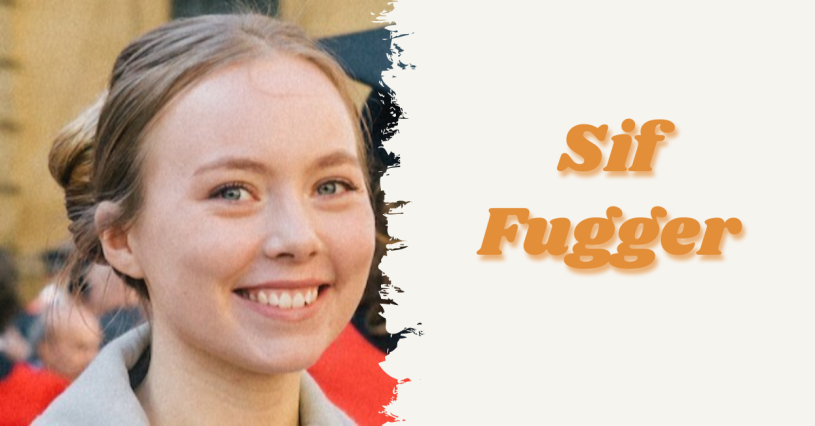Sif Fugger is an Optical Design Engineer at the company NIL Technology (NILT). She graduated from the Niels Bohr Institute, University of Copenhagen about 2.5 years ago with a master’s in quantum physics. Before this, she also studied for her bachelor’s degree in physics at the University of Copenhagen, where she chose to specialize in physics and mathematics.
Please give a description of the work you do in your current position.
I work at NIL Technology (NILT), a company that designs, develops, and manufactures diffractive and meta-optical elements. These optical elements are flat surfaces covered in nanostructures which, when designed in specific ways, can manipulate light differently so that it can, for example, focus it or bend light to very wide angles in ways that other types of optical elements can’t.
As part of the optical design team, I help create optical element designs for both internal development and customer projects. To do this, I work closely not only with the other members of the design team to improve design methods but also with colleagues from characterisation and processing within a development loop to gain insight into how to improve the designs and, in the case of unexpected results, figure out the root cause. I also, at times, wear other hats than an engineer at NILT. For some projects, I have more of a project manager role where other than providing the optical design, I also plan/organise the execution of the project.
What motivated you to study physics or engineering in the first place?
Since I was a young girl, I enjoyed learning about science and how it explains the workings of the world. Whether it is how the body works from a biological viewpoint, how molecules can interact with each other through a chemistry perspective, or how physics can be used to explain how the universe came to be with a bang!
Therefore, a big reason I chose physics was because I love how versatile it is. All the things that I was interested in learning about as a girl, physics is always at the root of it! Another big reason is that when I was in high school, I was introduced to quantum physics which piqued my curiosity due to how strange it was to understand, and I have always enjoyed a good challenge!
What made you decide to pursue a career in the private industry?
When I initially finished my master’s, I was very set on obtaining a PhD, even though I was unsure if I wanted to continue in academia or go into industry afterwards. The driving force behind why I wanted to do a PhD was that I wanted to continue learning and growing as a physicist by expanding into a research question that was different from what I did in both my bachelor’s and master’s projects within the quantum photonics group at the University of Copenhagen. When the opportunity to join NILT came along, however, I saw it as an opportunity to achieve the growth I wanted while gaining experience within industry at the same time – so I grabbed the chance!
How do you use the skills you learned as a physicist or engineer in your work?
I use many of them, but I also have been able to develop many of them further during my time at NILT, which has been great! I use them when designing optical elements, where my physics background has given me the theoretical understanding needed to make the designs, particularly my experience of designing nanophotonic phase shifters during my master’s project has been very useful! Coding is an important tool I use not only for designing but also for performing data analysis, which, along with statistics and data handling, are also skills that I learnt from being a physicist.
Although I don’t do any optical characterisation myself, both my master’s and bachelor’s projects involved optical characterisation, so the knowledge that I gained from them has also helped me at NILT in discussions with members of the characterisation team.
Finally, studying physics taught me how to have a logical approach to problem-solving in general, which is something that I do every day
What does being a physicist mean to you?
That’s a tough question to give a good answer to! To me, being a physicist means being a curious person who enjoys learning about physics. One of the things I find quite special when I am in a group of physicists is how much everyone loves to talk and discuss physics, even in their spare time! They not only like to discuss what they are investigating but are equally excited to learn from fellow physicists in different fields what it is they are researching.
In terms of personality, I would say it is someone who enjoys making sense of things but also finds it exciting when things don’t make sense, or at least that they don’t understand it yet
What advice would you give to young people (in particular women and minorities) with a background in physics who would like to pursue a career in the private industry?
What has served me well so far is always being ready to embrace an opportunity to learn something new. By this, I mean not only in terms of enhancing skills you might already have but also gaining knowledge from other colleagues who have different backgrounds from yourself and can offer you new approaches as well as new insights into problems that you weren’t aware of beforehand. It may sometimes feel challenging to put yourself in these situations, especially when you are the youngest and the only woman in the room, as you might worry about asking a stupid question, but the payoff is always worth it!
Publication date: June 13th, 2024

